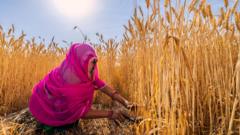Early summer is causing serious challenges for India’s agriculture and manufacturing sectors, with rising temperatures significantly disrupting traditional practices. In February, India recorded its hottest month in 125 years, leading to widespread anxiety among farmers and business owners.
Nitin Goel, a veteran clothing manufacturer from Ludhiana, faces a tough market as early summer threatens his business model. Traditionally focused on winter wear, Goel's company has seen sales dwindle by 10% this season alone, forcing a shift towards t-shirts instead of jackets. "Winter is getting shorter,” he lamented. "Our sales have halved in the last five years, and it’s a direct result of changing weather patterns."
In addition to declining sales, Goel notes that major retailers are now adopting a "sale or return" model, returning unsold stock and placing all financial risk onto manufacturers. Many smaller businesses in his city have already closed due to these shifts.
Farther south, heatwaves are wreaking havoc on the lucrative Alphonso mango orchards in Devgad, with farmers reporting an expected yield at just 30% of normal levels. By boosting irrigation and fertilizer expenditures, farmer Vidyadhar Joshi struggles to salvage his crops, even sending laborers back to Nepal due to reduced work.
The hot conditions are also jeopardizing staple crops like wheat and chickpeas. Despite reassurances from the agriculture minister about a forthcoming bumper wheat harvest, experts worry that severe heat could replicate last year's yield losses of 15-25%. The current reliance on imports may increase if these predictions ring true, especially as India's ban on wheat exports remains in place.
Moreover, as dire projections emerge regarding water availability and diminishing reservoir levels, economists warn of potential repercussions on food prices and inflation targets set by the central bank. The expected shortfall could erode the progress made in rural consumption, hindering GDP growth in an economy already facing private investment challenges.
Think tanks emphasize the urgency of developing a comprehensive response strategy to the heatwave crisis. This includes enhancing weather forecasting, implementing agricultural insurance, and adjusting cropping calendars according to climate change forecasts. With three-quarters of districts classified as "extreme event hotspots," the need for proactive measures has never been more critical.
As India heads into a future fraught with climatic challenges, the impact of ongoing heatwaves threatens not only the agricultural sector but economic stability as well. Without immediate corrective action, the potential for rising temperatures to undermine livelihoods and growth remains a pressing concern for this largely agrarian nation.



















